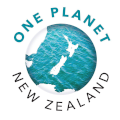Once you have refused, reduced, reused and recycled, you will have significantly reduced your waste and footprint. So what next?
Thinking about the system
There are several frameworks available internationally to help you understand links between consumer (or business) choices and environmental impacts.
Most are science-informed, using insights from ecology, physics and chemistry. One that we like is One Planet Living, instigated by Bioregional in the UK.
The 'circular economy' concept is catching on, where products are designed for later disassembly and upcycling, minimising waste and demand for new resources. Interface carpet tiles use this principle, as do Timberland for some shoes, with soles made from tyres that are designed with this re-use in mind.
Measuring impacts
Useful indicators of your effect on the planet are footprint estimators which use the proxy of hectares of land required to support your current home, travel, food and lifestyle, such as Global Footprint Network (which has a calculator pre-set for Australia but not NZ, and therefore does not take account of our higher proportion of electricity generation from renewable hydro, wind and geothermal energy). The World Wide Fund for Nature (WWF) has a footprint calculator designed for the UK. In NZ, the WWF encourages actions to reduce your carbon footprint.
Carbon emission from travel choices and of housing use and waste habits can also be estimated. New Zealanders can discover their estimated personal carbon footprint by completing the questionnaire on the FutureFit website. Bioregional (UK) have an interactive footprint website that looks at carbon impacts of homes alongside waste minimisation, travel, food & shopping, appliances, water use, etc.
Learning more
Many councils provide education programmes for residents, businesses and schools. For example Selwyn District Council offers workshops at its ReDiscover hub near Rolleston (these workshops are facilitated by Council staff), and Waimakariri District Council contracts education services to Eco Educate who visit schools and businesses, and host seminars and workshops for the community.
Several councils run waste education centres, such as Auckland's Zero Waste Zone, where children can learn about environmental sustainability via fun hands-on activities.
Not-for-profit Environment Centres or "Envirohubs" operate throughout the North and South Island - they are great sources of advice and inspiration for a low waste lifestyle. The Envirohubs encourage their local communities to get involved in a wide range of activities and initiatives which may include food rescue, repair cafes, replanting native habitat, community gardens and zero waste events.
Business sustainability
The NZ Sustainable Business Network has since 2002 been a forum for business-people who seek contact with others sharing that interest and wish to build markets with consumers who also 'get it'.

